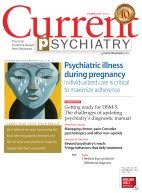
Robert M. Anthenelli, MD, Current Psychiatry Section Editor for substance use disorders, is professor of psychiatry, psychology, and neuroscience, director of addiction sciences division and Tri-State Tobacco and Alcohol Research Center, University of Cincinnati College of Medicine, and director of Substance Dependence Program, Cincinnati Veterans Affairs Medical Center, Cincinnati, OH.

Eugene Somoza, MD, PhD, Professor of clinical psychiatry, University of Cincinnati College of Medicine, and director of the Cincinnati Addiction Research Center, Cincinnati, OH.
Unlike opioid or alcohol abuse, for cocaine dependence there are no FDA-approved pharmacotherapies, which leaves psychosocial treatment as the standard of care for the estimated 1.6 million individuals in the United States who abuse cocaine. However, researchers are developing a novel way to help cocaine-dependent patients reduce their drug use. Therapy for addiction–cocaine addiction (TA-CD) is thought to curb cocaine use by engaging the body’s immune reaction and stopping cocaine molecules from reaching the brain, thereby reducing the drug’s pleasurable effects.
One researcher working on this vaccine, Eugene Somoza, MD, PhD—the principal investigator of the Ohio Valley Node of the National Institute on Drug Abuse clinical trials network of 16 universities and treatment programs—discusses with CurrentPsychiatry Section Editor Robert M. Anthenelli, MD, how TA-CD works and how it might be used in clinical practice.
Read full text (free access)
Comment on this article
Email the editor
Read full text (free access)
Comment on this article
Email the editor


No comments:
Post a Comment